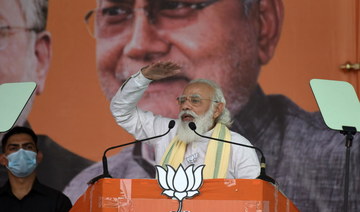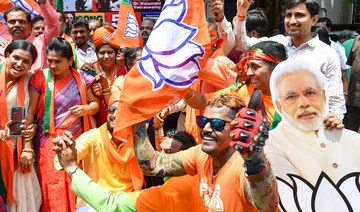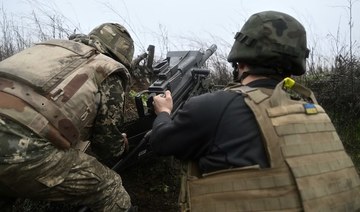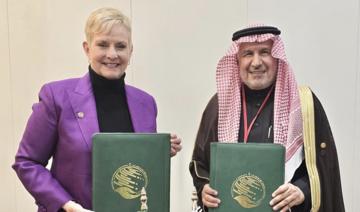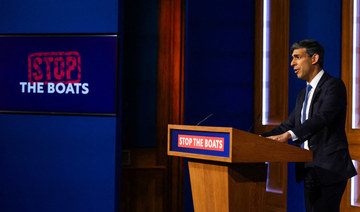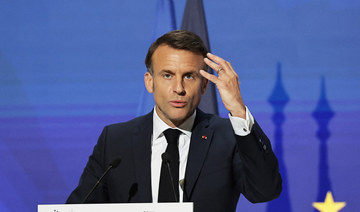NEW DELHI: India’s Prime Minister Narendra Modi and his Hindu nationalist party are making a serious bid for electoral victories in three states that have sizeable minority Muslim populations. But the Bharatiya Janata Party has for years been accused of stoking religious polarization and discriminating against minorities, and faces stiff challenges making inroads in the local elections.
Top BJP leaders, including Modi, have been campaigning heavily to win West Bengal and dislodge the state’s chief minister, Mamata Banerjee, as well as retain power in northeastern Assam and expand the party’s influence in the southern states.
The BJP has soared in Hindu-dominated regions in central and northern India since Modi was elected in 2014. The upcoming state elections are seen as crucial for the party to gain a foothold in the northeast and south. The prime minister also wants to project the BJP as a national party, replacing a dynastic Congress party that governed India for more than six decades after independence from British rule in 1947.
The run-up to the elections – which begin Saturday and are spread over a month, with results declared May 2 – has been nothing short of dramatic.
In West Bengal, rival groups have attacked each other with sticks and rocks, and even set vehicles on fire. Images of the fiery and determined Banerjee, 66, who’s been addressing massive crowds from a wheelchair after a leg injury, have set the tone for a tough battle.
The elections also come as tens of thousands of farmers have rattled Modi’s government with monthslong protests on the fringes of the capital, New Delhi. And India’s economy, which was battered by the pandemic, is still struggling to emerge out of the crisis – another pivotal challenge for Modi, who came into office partly on promises of economic development. Coronavirus cases are surging steadily nationwide, after dropping earlier this year.
Down south, experts say the BJP’s chances remain low. The party is vying for a third spot in Kerala, currently ruled by a Communist Party-led government. And in legislative elections being held in Tamil Nadu in April, both the BJP and main opposition Congress party have allied with powerful regional parties as junior partners.
But in West Bengal and Assam, the BJP is banking on its strong Hindu nationalist ideology to draw votes. The party is trying to galvanize Hindu support by promising to deport hundreds of thousands of Bangladeshi Muslims who fled decades ago to neighboring West Bengal and Assam. In 2018, Home Minister Amit Shah described them as “termites” eating into India’s resources.
The BJP also enacted a controversial citizenship law in 2019 that provides a fast track to naturalization for some migrants who entered the country illegally while fleeing religious persecution. But it excludes Muslims, which critics say is discriminatory and a violation of India’s Constitution.
Nationwide, Muslims comprise nearly 14 percent of the 1.4 billion population, while Hindus make up 80 percent.
However, across three states that are heading to the polls – Assam, Kerala and West Bengal – Muslims comprise around 30 percent of the population.
“(The BJP’s) success depends on if it is able to polarize Hindu votes to a huge extent, and get half of the 70 percent of Hindu votes,” said Subir Bhowmik, a political analyst.
The test for Modi is likely to be the toughest in West Bengal, analysts say, where the political discourse has shifted from issues to personalities.
And despite anti-incumbency fatigue against Banerjee, Modi is facing off against one of the state’s most popular figures in history, experts say. She’s been in power for 10 years after unseating more than three decades of Communist Party rule in the state.
In 2016, the BJP made history by winning power in Assam for the first time, ending the Congress party’s 15-year rule there. Observers say the BJP pulled off the win by reiterating its Hindutva message, raising the issue of illegal Muslim immigration from Bangladesh to appeal to Hindu voters.
But this time around, the Congress has teamed up with a key Muslim political party. “This is expected to give a tough fight to the BJP in Assam,” said Akhil Ranjan Dutta, professor of police science at Gauhati University.
“Its best hope remains in breaching West Bengal and consolidating its presence in Assam, its gateway to India’s northeast,’’ said analyst Nilanjan Mukhopadhyay.
India’s PM Modi faces big electoral test in Muslim areas
https://arab.news/ba645
India’s PM Modi faces big electoral test in Muslim areas
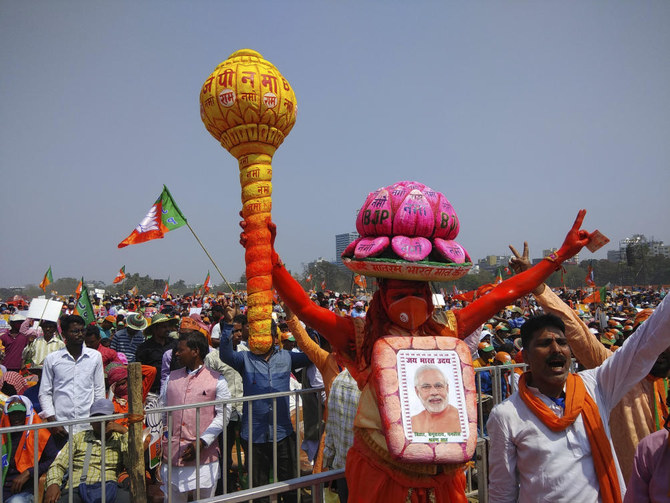
- Top BJP leaders have been campaigning heavily to win West Bengal and dislodge the state’s chief minister
- The test for Modi is likely to be the toughest in West Bengal, analysts say
A Chinese driver is praised for helping reduce casualties in a highway collapse that killed 48
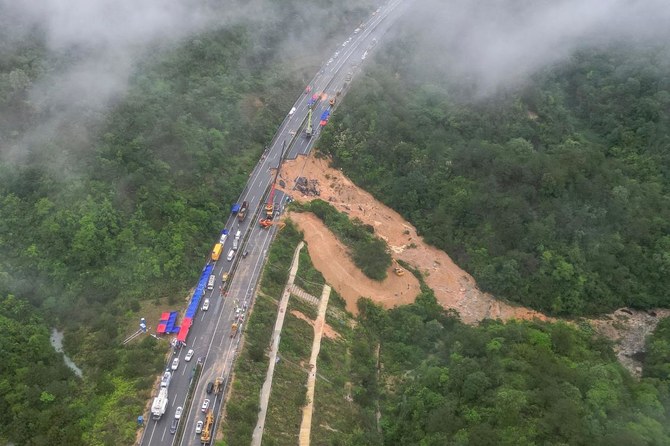
His wife got out of the truck to alert other drivers about the situation
BEIJING: A Chinese truck driver was praised in local media Saturday for parking his vehicle across a highway and preventing more cars from tumbling down a slope after a section of the road in the country’s mountainous south collapsed and killed at least 48 people.
Wang Xiangnan was driving Wednesday along the highway in Guangdong province, a vital economic hub in southern China. At around 2 a.m., Wang saw several vehicles moving in the opposite direction of the four-lane highway and a fellow driver soon informed him about the collapse, local media reported.
Reacting swiftly, Wang, a former soldier, positioned his truck to block the highway, effectively stopping dozens of vehicles from advancing into danger, Jiupai News quoted Wang as saying. Meanwhile, his wife got out of the truck to alert other drivers about the situation, it said.
“I didn’t think too much. I just wanted to stop the vehicles,” Wang told the Chinese news outlet.
Wang’s courageous actions not only garnered praise from Chinese social media users but also recognition from the China Worker Development Foundation.
The foundation announced Friday that in partnership with a car company it had awarded Wang 10,000 yuan ($1,414). A charity project linked to tech giant Alibaba Group Holding also gave an equal amount to Wang, newspaper Dahe Daily reported. Wang told the newspaper he would donate the money to the families of the collapse victims.
Local media also reported that another man had knelt down to prevent cars from proceeding on the highway.
The accident came after a month of heavy rains in Guangdong. Some of the 23 vehicles that plunged into the deep ravine burst in flames, sending up thick clouds of smoke.
About 30 people were hospitalized. On Saturday, one was discharged from the hospital, state broadcaster CCTV reported. The others were improving, but one remains in serious condition.
On Saturday, the Meizhou city government in Guangdong said in a statement that authorities would conduct citywide checks on expressways, railways and roads in mountainous areas. A team led by the provincial governor is investigating the cause of the collapse, Southcn.com reported.
The Chinese government had sent a vice premier to oversee recovery efforts and urged better safety measures following calls by President Xi Jinping and the Communist Party’s No. 2 official, Premier Li Qiang, to swiftly handle the tragedy.
The dispatch of Zhang Guoqing, who is also a member of one of the ruling Communist Party’s leading bodies, illustrates the concern over a possible public backlash over the disaster, the latest in a series of deadly infrastructure failures.
Russia says it shot down four US-made long range missiles over Crimea

- The ATACMS missiles, with a range up to 300km were used for the first time in the early hours of April 17
MOSCOW: The Russian defense ministry said on Saturday its air defense forces shot down four US-produced long-range missiles over the Crimea peninsular, weapons known as Army Tactical Missile Systems (ATACMS) that Washington has shipped to Ukraine in recent weeks.
The ministry said later that Russian aircraft and air defense systems had downed a total of 15 ATACMS in the past week.
On Tuesday, Russian officials said Ukraine had attacked Crimea with ATACMS in an attempt to pierce Russian air defenses of the annexed peninsula but that six had been shot down.
A US official said in Washington last month that the United States secretly shipped long-range missiles to Ukraine in recent weeks.
The ATACMS missiles, with a range up to 300km were used for the first time in the early hours of April 17, launched against a Russian airfield in Crimea that was about 165 km (103 miles) from the Ukrainian front lines, the official said.
The Pentagon initially opposed the long-range missile deployment, concerned that taking the missiles from the American stockpile would hurt US military readiness.
There were also concerns that Ukraine would use them to attack targets deep inside Russia, a step which could lead to an escalation of the war toward a direct confrontation between Russia and the United States.
Separately on Saturday, the Russian defense ministry said that in the last week its forces had destroyed a military train carrying equipment and arms produced in the West and supplied to Ukraine by NATO.
The scale of the damage, exact date and location were not disclosed.
Reuters is not immediately able to corroborate battlefield accounts from either side.
On Thursday, British Foreign Secretary David Cameron promised 3 billion pounds ($3.7 billion) of annual military aid for Ukraine for “as long as it takes,” adding that London had no objection to its weapons being used inside Russia, drawing a strong rebuke from Moscow.
South Sudan removes newly imposed taxes that had triggered suspension of UN food airdrops
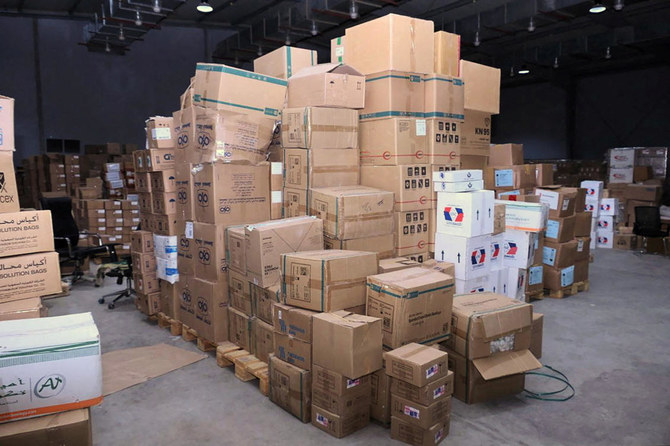
- The UN earlier this week urged South Sudanese authorities to remove the new taxes, introduced in February
- There was no immediate comment from the UN on when the airdrops could resume
JUNA, South Sudan: Following an appeal from the United Nations, South Sudan removed recently imposed taxes and fees that had triggered suspension of UN food airdrops. Thousands of people in the country depend on aid from the outside.
The UN earlier this week urged South Sudanese authorities to remove the new taxes, introduced in February. The measures applied to charges for electronic cargo tracking, security escort fees and fuel.
In its announcement on Friday, the government said it was keeping charges on services rendered by firms contracted by the UN peacekeeping mission in South Sudan.
“These companies are profiting ... (and) are subjected to applicable tax,” Finance Minister Awow Daniel Chuang said.
There was no immediate comment from the UN on when the airdrops could resume.
Earlier, the UN Humanitarian Affairs Agency said the pausing of airdrops had deprived 60,000 people who live in areas inaccessible by road of desperately needed food in March, and that their number is expected to rise to 135,000 by the end of May.
The UN said the new measures would have increased the mission’s monthly operational costs to $339,000. The UN food air drops feed over 16,300 people every month.
At the United Nations in New York, UN spokesman Stéphane Dujarric said the taxes and charges would also impact the nearly 20,000-strong UN peacekeeping mission in South Sudan, “which is reviewing all of its activities, including patrols, the construction of police stations, schools and health care centers, as well as educational support.”
An estimated 9 million people out of 12.5 million people in South Sudan need protection and humanitarian assistance, according to the UN The country has also seen an increase in the number of people fleeing the war in neighboring Sudan between the rival military and paramilitary forces, further complicating humanitarian assistance to those affected by the internal conflict.
More migrant dinghies cross Channel to England despite Rwanda threat
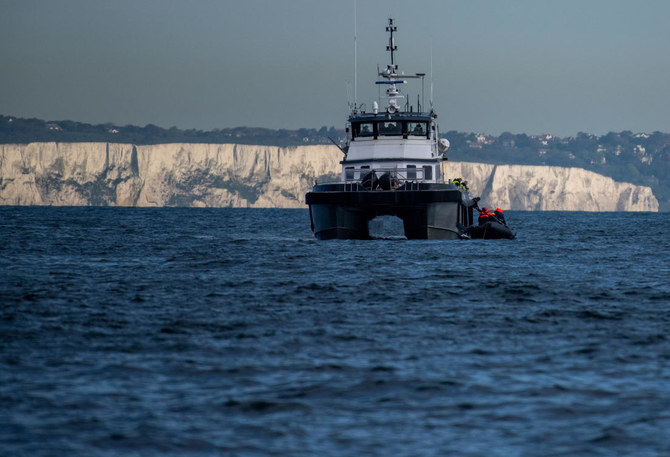
- The arrivals illustrate the difficulties British Prime Minister Rishi Sunak faces on his pledge to tackle illegal migration and “stop the boats“
- Sunak hopes his flagship Rwanda policy to deport those arriving in Britain without permission to the African nation will deter people from making the Channel crossing
STRAIT OF DOVER: Dozens of people in two rubber dinghies reached the southern coast of England on Saturday, the latest among thousands of asylum-seeking migrants to make the risky sea crossing from France this year.
Bobbing on the waves of the English Channel on a clear morning, the boats sailed across the narrow strip of sea separating France and Britain, with a French naval vessel following them until they reached English waters.
Their largely male passengers, some of whom were in orange life jackets and waving, were taken aboard a British Border Force vessel off Dover.
The arrivals illustrate the difficulties British Prime Minister Rishi Sunak faces on his pledge to tackle illegal migration and “stop the boats,” ahead of a national election expected later this year.
More than 8,000 people have arrived so far this year on small boats, with many fleeing war or famine and traveling through Europe to Britain, making the start of this year a record for such arrivals.
Sunak hopes his flagship Rwanda policy to deport those arriving in Britain without permission to the African nation will deter people from making the Channel crossing. Five people died in the attempt last month.
The government hopes to operate the first flights to Rwanda in 9-11 weeks.
“The unacceptable number of people who continue to cross the Channel demonstrates exactly why we must get flights to Rwanda off the ground as soon as possible,” a spokesperson for Britain’s Home Office said.
“We continue to work closely with French police who are facing increasing violence and disruption on their beaches as they work tirelessly to prevent these dangerous, illegal and unnecessary journeys.”
UK opposition suffers major Muslim vote losses in local elections
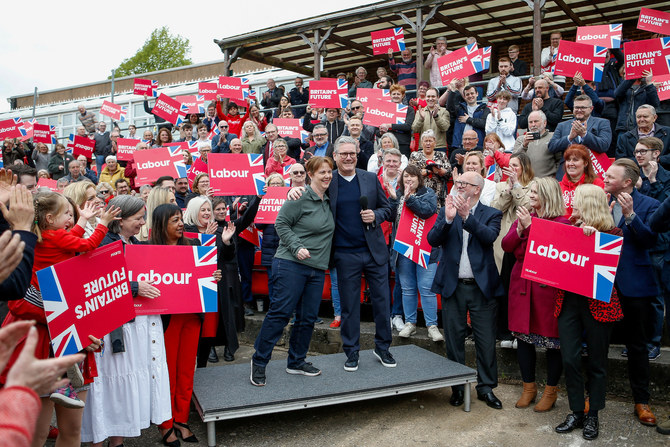
- Shadow home secretary: ‘Many people feel really strongly’ about Gaza ‘and rightly’
- Labour MP: ‘It’s not just Muslims. On our doorknocks, we’ve had a lot of middle-class white voters raise it as well’
LONDON: A series of local election victories by the UK’s opposition Labour Party has been overshadowed by a major fall in support among Muslim voters, leading to concern within the party ahead of a general election later this year.
After local elections were held across the country on Thursday, Labour suffered key losses in areas with high Muslim populations due to controversies over the party’s stance on the Gaza war.
Labour must do some “searching” in response to “questions” over its performance, one MP said.
The potential loss of Labour candidate Richard Parker in the West Midlands mayoralty election led to a racism row after an unnamed party source blamed “the Middle East” on deciding the race.
In total, the party gained more than 140 council seats during the elections, The Guardian reported.
But those gains are overshadowed by the potential West Midlands defeat and the Conservative candidate for mayor of London, Susan Hall, running a closer race against incumbent Sadiq Khan than previously expected.
Labour have “trouble brewing on their left flank” after focusing on traditionally rural and whiter areas, said Rob Ford, a politics professor at the University of Manchester.
“There has been a substantial loss of support in heavily Muslim areas and they are going backwards a bit in progressive areas and areas with students. It is progress at a price,” he added.
By offsetting urban losses with gains among rural voters, Labour would win about 34 percent of votes at a general election compared to 25 percent for the Conservatives, the BBC reported.
Yet fear of bleeding urban voters, including Muslims, is driving anxiety in the party ahead of the general election, sources told The Guardian.
“The polls (which predicted a 20-point lead for Khan) were completely wrong, this is going to be much closer than expected,” one source said.
A source in Birmingham, where independent candidate Akhmed Yakoob stood as a spoiler to Labour, said: “Yakoob is picking up over 50 percent in some inner-city wards, so the Gaza impact may be bigger than first estimated.”
Labour also suffered a shock loss in Oldham, losing control of the council after a number of seats were taken by pro-Palestinian independent candidates.
In Manchester, the party lost its deputy leader to a candidate from MP George Galloway’s Workers Party of Britain.
Jess Phillips, Labour MP for Birmingham Yardley, told the “Electoral Dysfunction” podcast in the wake of the vote that the party will have to “wake up and face” the issues that led to losses against independent and Workers Party of Britain candidates.
“I very much expect, as the mayoral votes come in, that in places like Birmingham, Bradford, places with high Muslim populations, as we’ve seen overnight in Oldham, that the Labour Party will have some questions that they have, and some searching to do themselves,” she added, according to Sky News.
Areas with a proportion of Muslim voters higher than 20 percent recorded average losses of 17.9 points for Labour.
The comments by a party source concerning the West Midlands race have led to a post-election race row.
“It’s the Middle East, not West Midlands that will have won (Conservative Mayor Andy) Street the mayoralty. Once again Hamas are the real villains,” the Labour source reportedly told the BBC.
The remarks were condemned by figures including Labour MP Bell Ribeiro-Addy, the Daily Telegraph reported.
“This is a disgusting way to talk about Muslim voters, conflating them with Hamas and treating them as a monolith,” she said. “It reeks of racism and entitlement. Such comments should have no place in the Labour Party.”
According to The Times, MP Zarah Sultana said: “Once again, I’m deeply disturbed by Islamophobic quotes given to the media by ‘Labour sources.’
"When politicians are confronted with racist bile, it should be immediately condemned. As a party we need to listen to and acknowledge concerns, not hold British Muslims in contempt.”
Yvette Cooper, Labour’s shadow home secretary, conceded that the party’s stance on a Gaza ceasefire was “partly” a factor in the surprise defeats.
“Many people feel really strongly about this — and rightly, because tens of thousands of people have been killed, including the majority of them women and children,” she said.
Muslim vote organizers hailed the success of the elections in sending a message to Labour leader Keir Starmer.
Party sources warned that Labour must work overtime to regain the trust of Muslim voters ahead of a general election expected later this year.
“People use local elections to send the government — and sometimes the opposition — a message,” a senior Labour source told The Times.
“The damage is done and even though our position is much better now, if Israel pushes into Rafah people will say we didn’t do enough to urge restraint right at the start.”
A Labour MP added: “It’s terminal with a lot of people, and it’s not just Muslims. On our doorknocks, we’ve had a lot of middle-class white voters raise it as well.”



